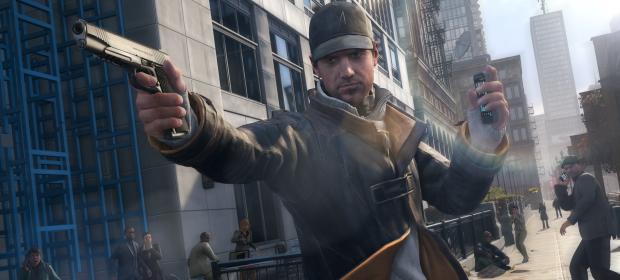With a title as highly anticipated as Watch Dogs, it’s hard not to be at least slightly sceptical. In an industry built on hype and clever marketing, gamers are constantly told that each new release is bigger and better than anything that has come before –and yet, quite often, they are far from it. After all the dubstep-filled cinematic trailers, the glowing previews and the million dollar marketing campaigns, when the latest big budget game actually makes its way to your hands, more often than not it fails to meet the impossibly high expectations.
As one of the most hyped games of the last few years, Watch Dogs has always promised to be an exciting new take on the open world genre, claiming to give players the ability to hack into and manipulate the city of Chicago at will. Yet it has been a concern that it wouldn’t be able to fully deliver on this lofty promise. Well, gamers, after years of nervous anticipation, it’s time to breathe a sigh of relief – because in this regard, Watch Dogs most certainly delivers.
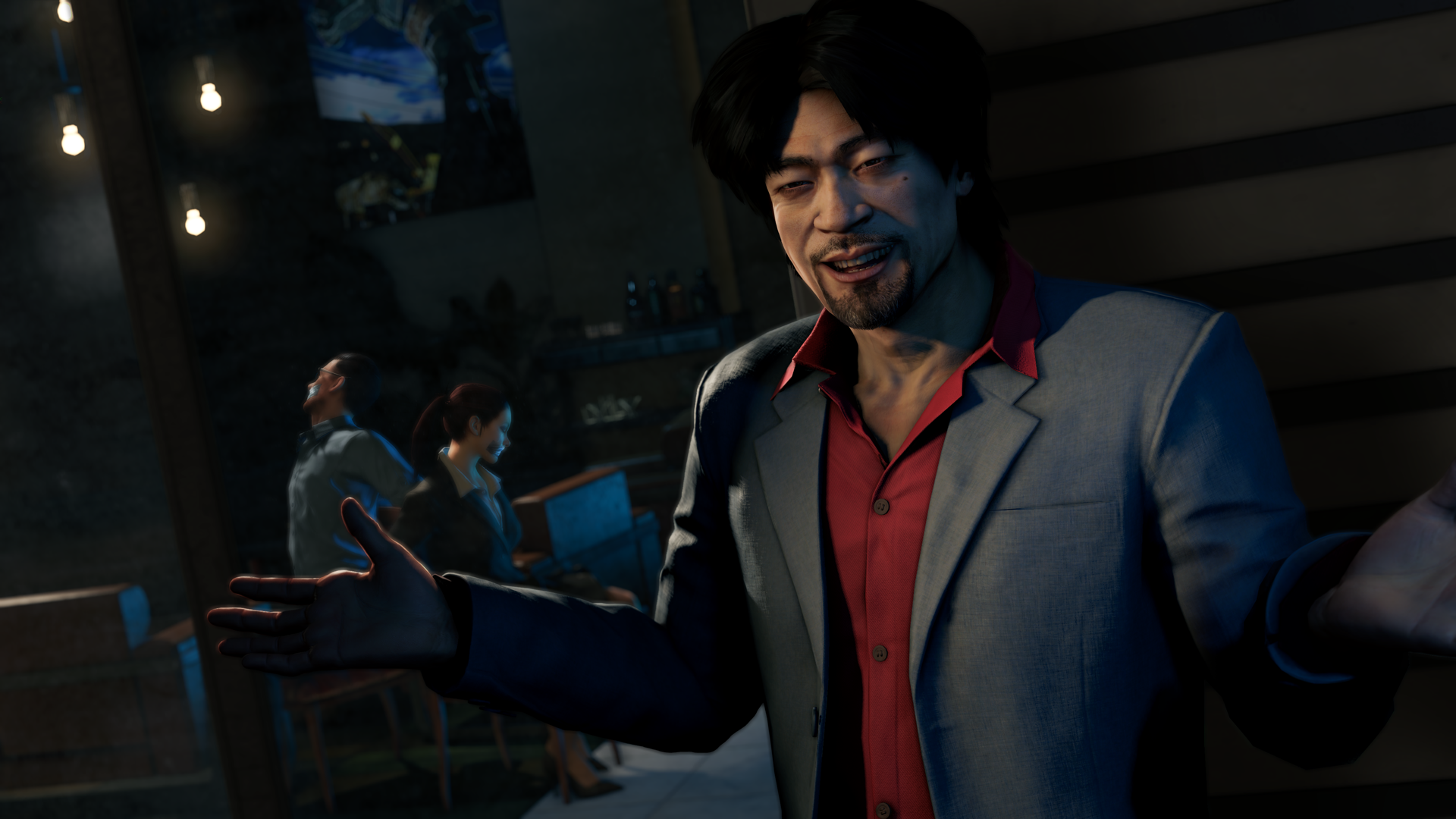
While GTA V was a technical marvel and excelled at brilliant satire and story telling, Watch Dogs does something that Rockstar’s open world opus simply doesn’t: it makes you feel in control. Set in a near future Chicago, the entire city is now run on an advanced operating system called ctOS, and while the company behind it, Blume, have assured the public that it is secure, our hacker protagonist Aiden Pearce quickly proves otherwise. Unlike in GTA, if you’re tailing a perp down the mean city streets you don’t just have access to a car and your gun; you have the entire city’s ctOS system at your fingertips. Don’t want to participate in a twenty minute car chase? Then wait until your target drives over a steam pipe and blow him to smithereens. Prefer less collateral damage? Why not raise the bollards in front of him and watch him slam to a halt? You can even ignore hacking entirely and chase after him manically with a shotgun. The point is that the choice is yours.
Watch Dogs is all about giving the player options – and there often seems to be a wealth of them to choose from. After the infuriating linearity that plagued missions in Assassin’s Creed, Ubisoft’s new-found open approach to tackling objectives is one that should be applauded. During one mission I was tasked with infiltrating a well guarded base and hacking its access point. In most games, there would be one major choice to make: do you go in all guns blazing, or do you take a more subtle approach and sneak through the base? I chose neither. Instead I opted to hijack a boat, sail around the guards and hop out on the shore nearest my objective, hacking the access point without alerting a single enemy.
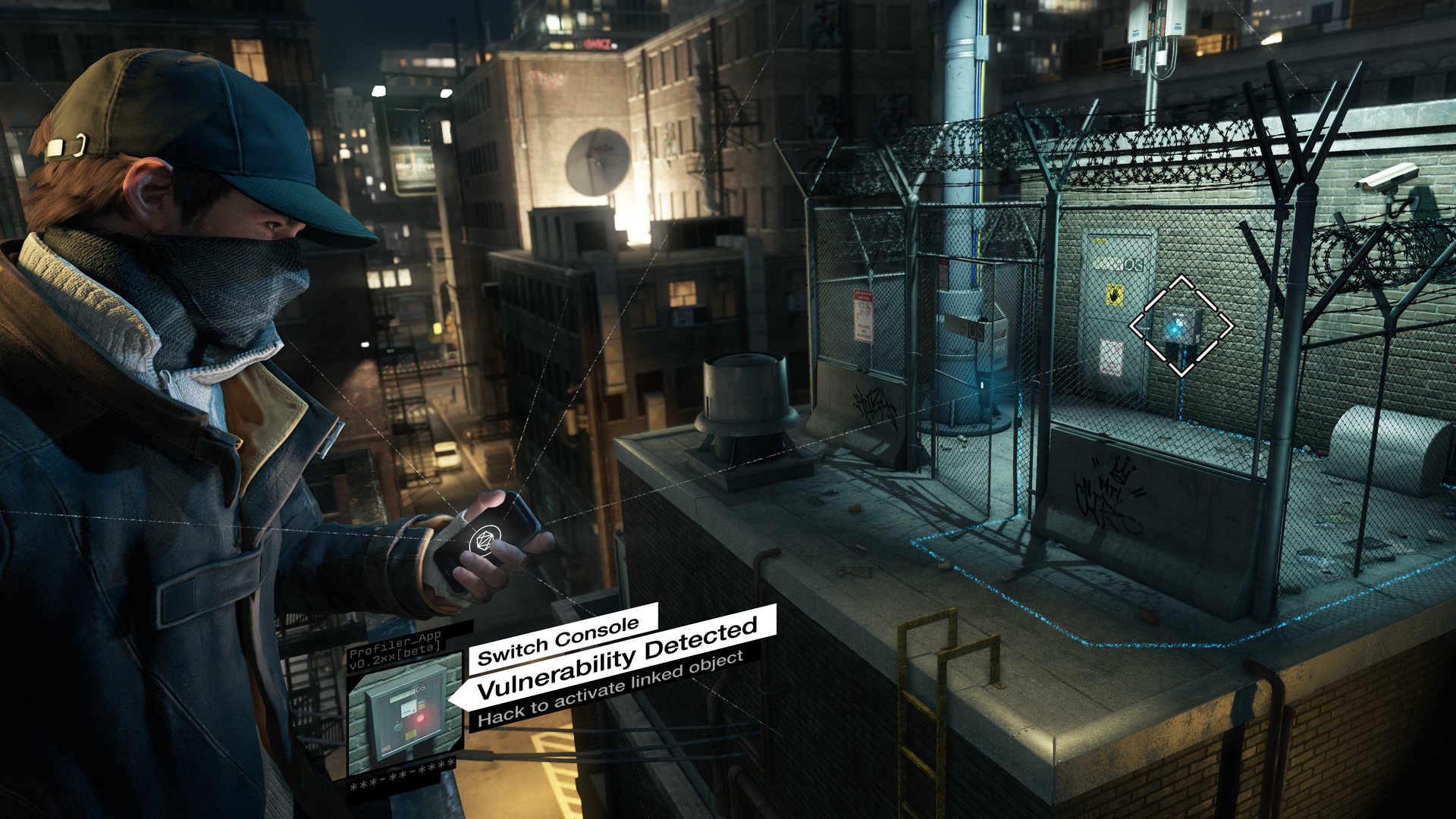
While the freedom presented to you in the brilliantly imagined virtual Chicago is one half of what makes the game’s missions so enjoyable, what really separates Watch Dogs from the crowd is, of course, your ability to use hacking in and out of combat. From initially profiling everyone who walks by you to the first amusing NPC text message you pry into, the hacking mechanic feels consistently enjoyable and unique throughout. Having a few lines of information on all NPCs is a simple touch, but a surprisingly effective one, and there are an impressive amount of different phone conversations for you to eavesdrop on. As well as snooping on members of the public, this mechanic also makes combat more of a moral dilemma then most recent games have dared to. When you’re told the cop looking for you is a newly wed it makes you think twice about how you deal with him, and while eventually the randomly assigned information loses its impact, the attempt to humanize the often faceless enemies you mow down is an interesting one.
As well as being a fun toy to play with while roaming the city, your hacking abilities become incredibly useful when contained in some of the smaller combat-focused missions too. While stealth sections in modern games can often feel like a chore, using the technology around you to wreak havoc and remain unnoticed feels consistently thrilling here. When tasked with clearing a base, your initial move will be to hack the nearest camera. Once you’re into a camera, you are presented with the lay of the land – and a playground full of wonderful hacking possibilities. The tools at your disposal can range from moving forklifts and setting off guards’ phones to distract them, to hacking their explosives and using other aspects of their environment against them. This is before even taking in the options presented to you by the craftable hacking items. Seeing the guards fall into a panic while picking them off from a safe distance is a joy to behold, and while it’s something you’ll end up experiencing often throughout the game, it says a lot that it never really grows old.
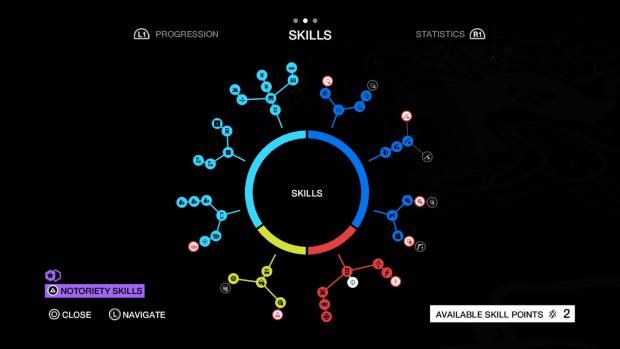
Watch Dogs skill system fits in perfectly with however you choose to play, and as you would expect, gives you the option of different fields to specialize in: hacking, driving, crafting and combat. Each time you level up you will get to assign skill points, and given how often you earn XP, it is likely that you will end up unlocking the vast majority of abilities for at least two of those fields.
A sense of choice and flexibility seems to be rooted in every aspect of Watch Dog’s design, and even extends to how Ubisoft Montreal have handled the game’s online component. While running around causing mayhem, or if you’re a more upright citizen – travelling to your next objective – an invite will often pop up for an online challenge. If you choose to accept, you will be transported to the race or mission’s objective, as you would expect. When you’ve finished your match however, the other players disappear, while you remain in the same location – but now seamlessly transplanted back in the single player world. The sheer fluidity of the transition from single player to online took me off guard, and felt like a breath of fresh air after the haphazardly separated experience of GTA V’s online component.
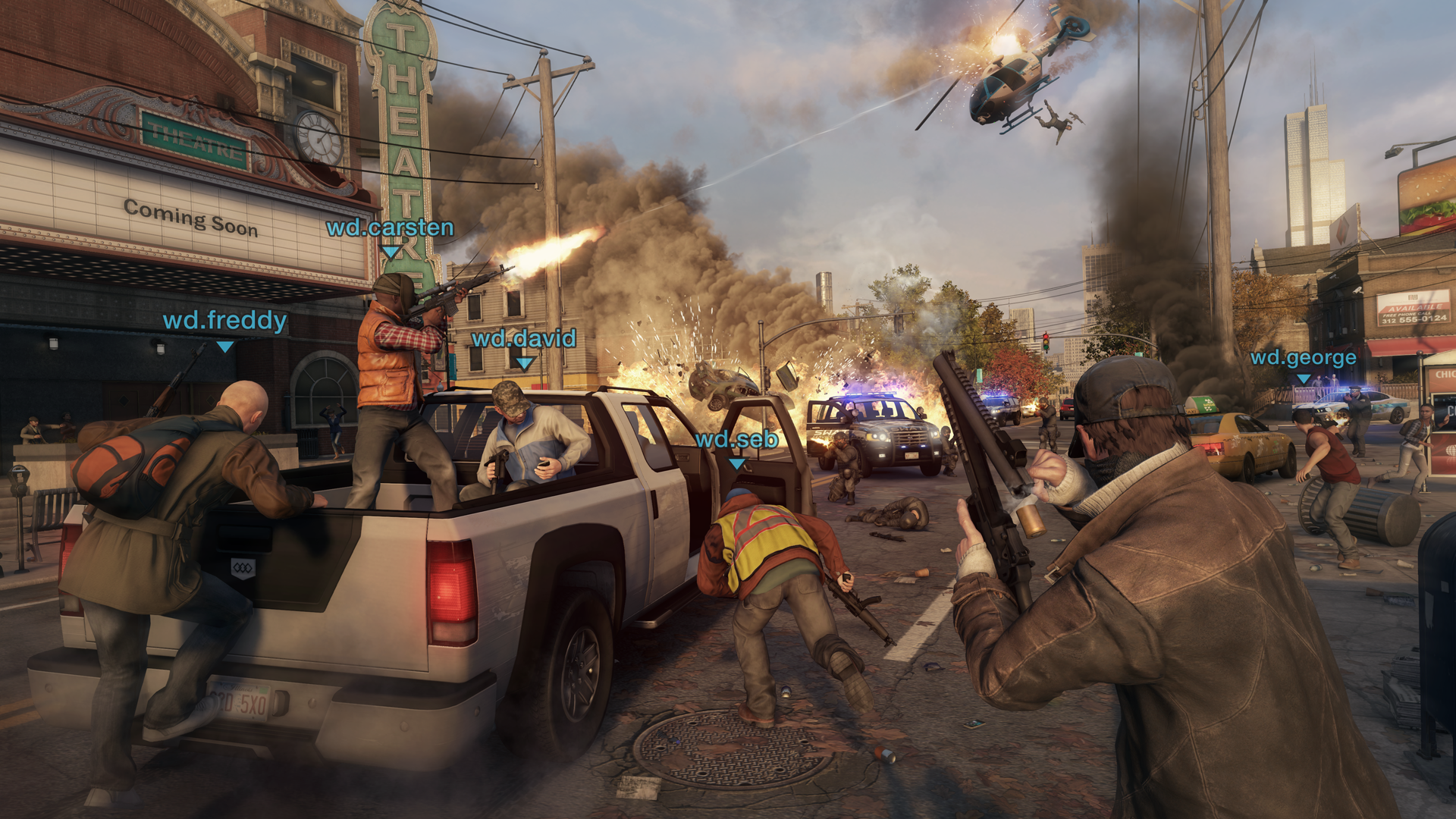
As well as the expected optional online matches, Watch Dogs’ other online component likes to keep you on your toes. At any given moment your current flow in the game can be interrupted as your world is invaded by another player without warning. Once invaded, it becomes a tense race against time to identify the human player lurking amongst the AI, and take them out before they manage to hack into your systems. While already introduced in the Assassin’s Creed series, the concept of a human player trying to blend in as part of the program still feels relatively original, and is used in three of Watch Dogs’ online modes to great effect. Aside from these contained multiplayer matches, a GTA-rivalling 8-player free roam mode is also available, although given the former’s larger player count on an older console, the meagre eight slots offered is a bit disappointing.
If you do somehow manage to tire of the story missions, the three types of side missions, the online matches, or just generally causing open world mayhem, you can always indulge in something a bit different. Watch Dogs is littered with a large amount of surprisingly fun little distractions, offering you a completely different tone and aesthetic to the rest of the game. These come in augmented reality phone games and the rather amazing digital trips. Sick of blasting people around a realistic and serious city? Why not take a palette cleansing Psychedelic Digital Trip and indulge in a colourful mini game that sees you bouncing between giant flowers. These off the wall digital trips and a fun collection of mini games are unexpected and enjoyable distractions from the main game. You can also play chess, indulge in Cash Run AR games and find yourself in drink-offs with Chicago’s resident drunk.
While Watch Dogs’ open ended nature and wealth of options are highly impressive, the game’s story isn’t quite as revolutionary. After hacking somewhere he shouldn’t, what should have been a routine job for Aiden Pierce goes wrong and leads to an early tragedy. While starting off fairly strong, Watch Dogs’ story is ultimately a pretty unremarkable revenge thriller. That isn’t to say that the story is awful – it’s more that it hints at a potential that it never quite realizes. Some of the cutscenes are brimming with tension and the team have even been brave enough to touch on surprisingly dark subject matter. A particularly memorable mission sees you infiltrating a sex trafficking auction, and hacking through the attendees phones yields predictably skin-crawling results. Sadly, though, these brilliant moments are often over too quickly, and while the narrative seems to set itself up for some great moments, it often squanders what could have been and winds up in a predictable game of cat and mouse – paling in comparison to recent writing master-classes like GTA V or The Last of Us.
Watch Dogs also suffers from a few questionable design choices. While in-game currency is plentiful, the ability to pick up your enemy’s weapons renders it largely useless. Another more useful way to spend your cash is on cars which can in theory be delivered to you. This service rarely seemed to work, however, and instead you are left with the far more enjoyable (and cheaper) option of stealing cars. Speaking of cars, Watch Dogs has one frankly bizarre omission – the ability to shoot and drive. For a game filled with car-based missions it baffles the mind that such an obvious mechanic was not included.
Being the first “next gen” game ever to be shown, there are pretty high expectations from Watch Dogs in the graphics department. Visually, it’s highly detailed and a joy to look at on PS4, but those expecting it to mirror the initial E3 footage will be sorely disappointed. While cities and water effects impress, out in the grassy sections the IQ and lo-res greenery leave something to be desired. Yet this is a minor gripe in an otherwise beautiful game. The action ran smoothly throughout, and thankfully loading screens are saved only for certain story missions – which is a trade off that makes the slight visual downgrade very much worth it.
VERDICT: After a generation that brought us seven years of countless linear and identikit shooters, Watch Dogs is the open world adrenaline shot that fatigued gamers needed. While the story could have been better and Ubisoft have made a few questionable design choices, it’s rare to see a big budget game that offers players freedom in almost every aspect of its design – and, more importantly, one that is this much fun while doing so.

SUPERB. This is the mark of greatness, only awarded to games that engage us from start to finish. Titles that score 9/10 will have very few problems or negative issues, and will deliver high quality and value for money across all aspects of their design.
Review based on time spent at an Ubisoft-hosted review event, and at-home play time.


